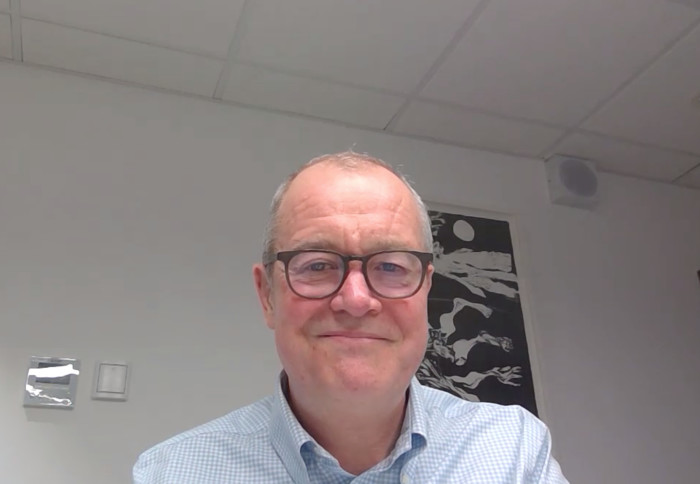Sir Patrick Vallance delivers Hammersmith and White City Distinguished Lecture
by Ellyw Evans

Government Chief Scientific Adviser, Sir Patrick Vallance, spoke on science in government and shared insights into the UK's response to COVID-19.
Sir Patrick Vallance delivered this year’s Hammersmith and White City Distinguished Christmas Lecture in an online event for College staff and students.
Formerly President of R&D at GlaxoSmithKline and Head of the UCL Division of Medicine, Sir Patrick Vallance took on the role of Government Chief Scientific Adviser in 2018. He has played a prominent role in guiding the government’s response to the pandemic, along with Chief Medical Officer Professor Chris Whitty.
Speaking on the theme of 'Science in Government', Sir Patrick Vallance made the case for why science in government matters, as well as reflecting on his role as Government Chief Scientific Adviser during the pandemic, covering the challenges and lessons learnt.
Watch the full lecture below.
Reflecting on the challenge of taking on the role of Government Chief Scientific Adviser in 2018, Sir Patrick said while science in government can play an important role at certain times, it is not systematically embedded through the government structure. On starting the role he was given the advice: “Try to make science as integral to the functioning of government as economics is.”
The role of SAGE
Sir Patrick then took the audience through some insights of the scientific response to the pandemic and outlined the role of SAGE – Scientific Advisory Group for Emergencies – which he co-chairs.
“Since our first SAGE meeting in the third week of January, we've had over 70 meetings, published over 400 papers, and hundreds of scientists have been involved in one form or another, either as members of SAGE, the subgroups that we have formed, or as the groups in academia working with those people who are in the subgroups. A number of those people have come from Imperial and have been quite prominent in this response.”
Imperial's scientific contribution
Sir Patrick highlighted Imperial’s contribution to SAGE, mentioning the work of Professor Neil Ferguson’s team of epidemiologists in particular:
“I'd like to take this opportunity actually to thank those people because it's been an incredible effort. I do want to put a call out for Professor Neil Ferguson [and team], who have been absolutely fantastic, really unbelievably insightful and helpful throughout this.”
Sir Patrick went on to highlight the UK research community’s effort in delivering evidenced-based COVID-19 therapies, highlighting the success of the nationwide RECOVERY trial which included Imperial College NHS Trust as a recruiting site.
Imperial's COVID-19 vaccine project led by Professor Robin Shattock and the REACT programme for community coronavirus testing led by Professor Paul Elliot were also acknowledged.
"Vaccines have been a real success story"
Speaking on a landmark week when the first NHS patients received a COVID-19 vaccine, Sir Patrick mentioned that vaccines are a “real success story” of the pandemic. He said:
“It was clear that vaccines were going to be a crucial way to tackle this epidemic. Early on, we realised that we had to invest in vaccines and to make sure that, not only did we support the domestic vaccine projects, and of course the work at Imperial was one of those, but also looked at where vaccine programmes were taking place across the world.”
Sir Patrick closed with a personal remark on the importance of having teams and support systems around you in a crisis and paid tribute to the Chief Medical Officer, Professor Chris Whitty:
"I could not have done what I needed to do over the past year if it wasn't for the fact that I was working alongside Chris Whitty…a strong lesson for me is to make sure you know who that person is when you're going into this sort of crisis”.
The voice of science
The online lecture was closed by Professor Jonathan Weber, Dean of the Faculty of Medicine, who thanked Sir Patrick for being "the voice of science":
“On a personal level and on behalf of the College, I just wanted to say how proud we are of you, and what you've done. I can only imagine what it's been like for you to be such a public face of scientific opinion, and under such extraordinary media scrutiny. I say that with some awe at what you’ve achieved and the calmness you seemed to have done it.”

The Hammersmith and White City Distinguished Christmas Lecture was first held in 2009, and previous Christmas lecturers have included Sir Mark Walport, Sir Paul Nurse and last year, Professor Fiona Watt. The event was hosted by Professor Sian Harding, Campus Director for Hammersmith and White City, who said:
“We were delighted that Sir Patrick could find time in his intense schedule to join us. There has been a hugely appreciative response from the audience to his honesty and insights into Government policy-making. This Christmas lecture always aims to bring together the Hammersmith and White City community with the wider College. The virtual format allowed even more College staff and students the opportunity to attend”.
Article text (excluding photos or graphics) © Imperial College London.
Photos and graphics subject to third party copyright used with permission or © Imperial College London.
Reporter
Ellyw Evans
Faculty of Medicine Centre
